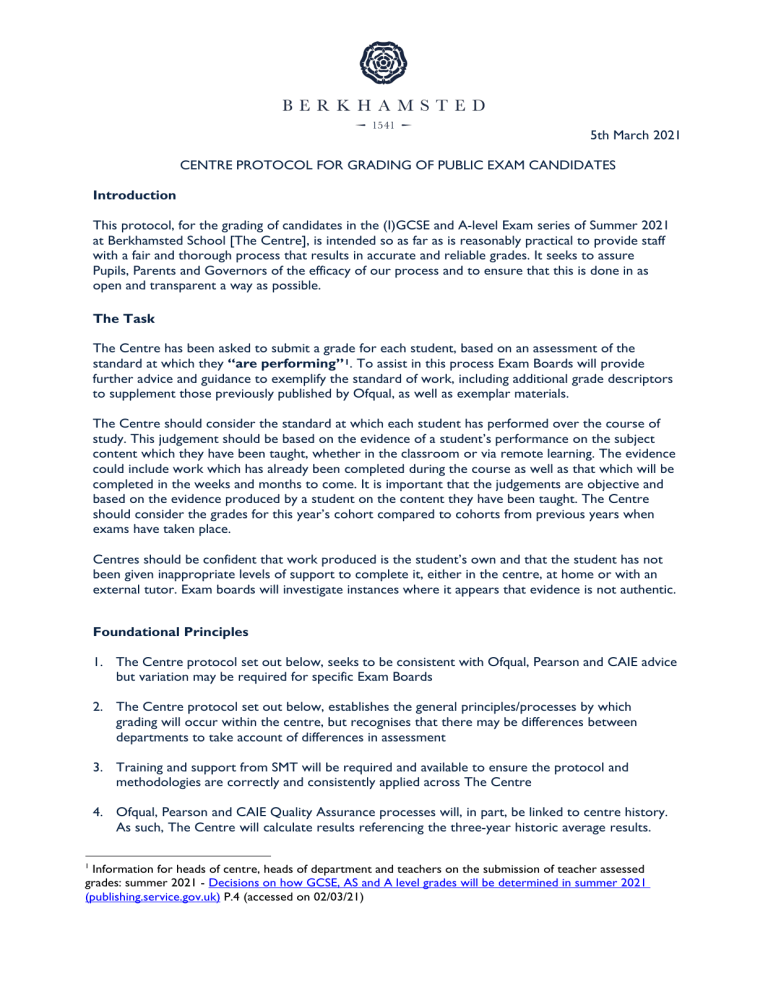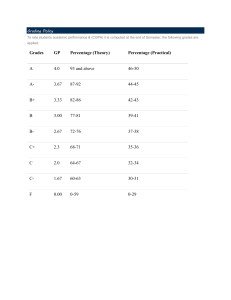
5th March 2021 CENTRE PROTOCOL FOR GRADING OF PUBLIC EXAM CANDIDATES Introduction This protocol, for the grading of candidates in the (I)GCSE and A-level Exam series of Summer 2021 at Berkhamsted School [The Centre], is intended so as far as is reasonably practical to provide staff with a fair and thorough process that results in accurate and reliable grades. It seeks to assure Pupils, Parents and Governors of the efficacy of our process and to ensure that this is done in as open and transparent a way as possible. The Task The Centre has been asked to submit a grade for each student, based on an assessment of the standard at which they “are performing” 1. To assist in this process Exam Boards will provide further advice and guidance to exemplify the standard of work, including additional grade descriptors to supplement those previously published by Ofqual, as well as exemplar materials. The Centre should consider the standard at which each student has performed over the course of study. This judgement should be based on the evidence of a student’s performance on the subject content which they have been taught, whether in the classroom or via remote learning. The evidence could include work which has already been completed during the course as well as that which will be completed in the weeks and months to come. It is important that the judgements are objective and based on the evidence produced by a student on the content they have been taught. The Centre should consider the grades for this year’s cohort compared to cohorts from previous years when exams have taken place. Centres should be confident that work produced is the student’s own and that the student has not been given inappropriate levels of support to complete it, either in the centre, at home or with an external tutor. Exam boards will investigate instances where it appears that evidence is not authentic. Foundational Principles 1. The Centre protocol set out below, seeks to be consistent with Ofqual, Pearson and CAIE advice but variation may be required for specific Exam Boards 2. The Centre protocol set out below, establishes the general principles/processes by which grading will occur within the centre, but recognises that there may be differences between departments to take account of differences in assessment 3. Training and support from SMT will be required and available to ensure the protocol and methodologies are correctly and consistently applied across The Centre 4. Ofqual, Pearson and CAIE Quality Assurance processes will, in part, be linked to centre history. As such, The Centre will calculate results referencing the three-year historic average results. 1 Information for heads of centre, heads of department and teachers on the submission of teacher assessed grades: summer 2021 - Decisions on how GCSE, AS and A level grades will be determined in summer 2021 (publishing.service.gov.uk) P.4 (accessed on 02/03/21) These will give an indication as to the baseline that 2021 grades could be compared with by Exam Boards. If a department believe their 2021 cohort is atypical and much better/worse than the historic average, they should collate evidence to support this (e.g. MidYIS/Alis baseline measures, comparative data-points etc.) 5. In making grade judgements staff should always: - Follow the School protocol and departmental methodology - Use statistical information to inform judgements, but not to make judgements. - Judge pupils against the national standard not the School standard 6. The Centre will not be considering the following in making grade judgements: - Grades needed for university entry. As in any assessment year the public exams process must be kept entirely separate from the UCAS system. Students must be awarded grades on the basis of attainment evidence/teacher professional judgement and not what is needed to meet a university offer. - Grades needed for sixth form progression – as above - Pupil/parent reaction 7. The Centre protocol will include a check for unconscious bias e.g. on gender, race, ethnicity grounds,SEND. This will be done statistically using historic centre data. In small departments (of two or fewer teachers) additional staff will support the process and review grade decisions 8. The Centre protocol will take into account Special Consideration in line with the normal processes for so doing found in this document: A-guide-to-the-spec-con-process-201920.pdf (jcq.org.uk) 9. Conflicts of interest e.g. staff children will be documented. Members of staff should not be involved in any decision making where they are conflicted 10. All grading decisions will be kept confidential until August Results Days or until such time as boards confirm that different arrangements pertain. The General Protocol for generating grades for recommendation to Exam Boards Stage 1 - The Senior Management Team [SMT] will use evidence from a range of sources to provide an initial grade for every student entered in each subject. These will include • Student work produced in response to assessment materials provided by Exam Boards including groups of questions, past papers or similar materials such as practice or sample papers. • Non-exam assessment (NEA) work where available • Student work produced in centre-devised tasks that reflect the specification, that follow the same format as exam board materials and have been marked in a way that reflects exam board mark schemes (for example, mocks, “Cross Campus Tests”). • Records of a student’s capability and performance over the course of study in performance-based subjects such as music, drama and PE. • Records of each student’s progress and performance over the course of study. The weighting of each type of evidence will vary from subject to subject and will be determined through a dialogue between the SMT and Heads of Department [HoDs]. The School notes Ofqual’s guidance that more recent evidence is likely to be more representative of student performance, although there may be exceptions and will ensure that work completed at the end of the course receives greater weighting. Stage 2 – HoDs will receive these initial grades and then meet with teachers to discuss if they are a fair representation of the standard at which a pupil is working. Evidence of a pupil's work above or below a grade standard will be required for a grade to change and the reasoning must be minuted. Stage 3 – a further, final departmental meeting is held to sign off the grades at least two days later to allow for time to reflect on decisions. Grade decisions must be signed off by at least two teachers in that subject, one of whom should be the Head of Department (or where if there is only one teacher or only one is available, by the Head of Centre). All decisions are sent to SMT Stage 4 – The SMT and Head of Centre confirm assessment grades for each subject and send to exam boards. The Head of Centre will be required to confirm that the centre assessment grades are a true representation of student performance. (If the Head of Centre is unavailable to do this, it may be delegated to a Deputy). In reviewing these centre assessment grades, the Head of Centre will consider how the distribution of centre assessment grades compares with grades achieved by the centre in previous years. Exam boards will provide external quality assurance for this process. The external quality assurance arrangements will be focused on making sure that the process and evidence used by centres to determine a grade is reasonable. For example, Exam boards will sample some evidence used by The Centre as part of their quality assurance, and if not satisfied, could ask a centre to reconsider its grades for a subject.
